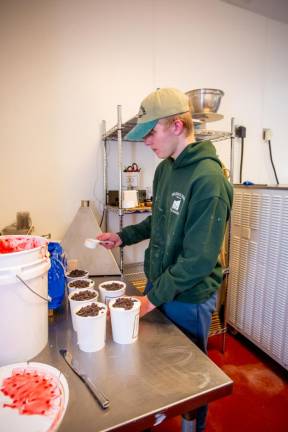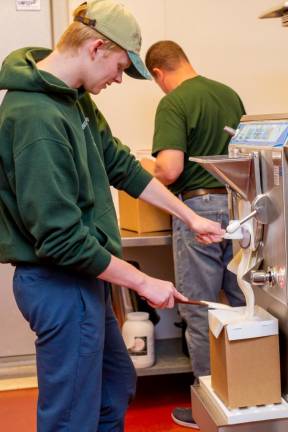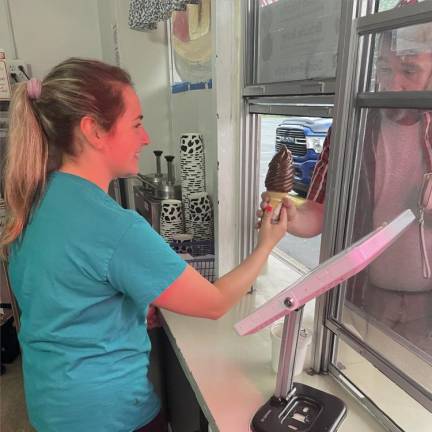Teens search for jobs; employers get picky
Editor’s Note: For those under 21, we agreed to use just their first names in this story.





Local teens report they cannot find summer jobs or ones that pay enough. Employers say they are having trouble finding summer help willing to work hard.
According to the U.S. Bureau of Labor Statistics, 55.3 percent of people ages 16 to 24 were employed in July 2022, up slightly from a year earlier.
Amber, 19, of Warwick, N.Y., applied to more than 15 places, many of which had help-wanted signs, and has received only one call back so far.
Julia, 19 of Vernon, N.J., applied to many employers, such as restaurants, day-care centers, clothing stores and a spa.
“I applied to anything I could find. I’m still waiting to hear back, but they (employers) made it seem they would hire me,” she said. “Others said they were full for the summer.”
Amber and other local teens interviewed for this article found work with DoorDash after struggling to find a traditional summer job. The app allows “Dashers” to work as independent contractors delivering for restaurants, grocery stores and other retailers.
‘They need to hustle’
While teenagers are striking out finding jobs, employers are sifting through applicants to find workers with a strong work ethic to meet their demands.
Lynne Gallo, a manager of Tomahawk Lake in Sparta, N.J., has been hiring for this season. The company has seen multiple applicants and is looking for new hires.
“People that applied and have agreed to take the job now are starting to say they have found another job,” she said.
She believes other employers offered higher pay.
Gallo plans to continue hiring.
“The people who want to work are good workers. The people who don’t want to work, their ethics aren’t that good. They’re being pushed to do something they don’t want to do,” she said.
Hiring people who don’t want to be there “undermines and demeans the other staff who are good workers.”
“You have one rotten apple who ruins the bunch,” she added.
Anastasia, 17, of Goshen, N.Y., made similar remarks when discussing the work ethic of younger employees. Her teen co-workers at a local theme park do the “bare minimum,” she said, while employees returning from college “take the job more seriously.”
Fewer high school workers seem to be applying, according to Gallo.
“I see a lot of 14- and 15-year-olds, not as many teens who are 17 and 18, and then more that are in college,” said Gallo. “Some of the work ethic is bad. Those 17 and 18 were in COVID during the ages of 14 to 15.”
Parents asking
Amy Noteboom, manager of Bellvale Farms Creamery of Warwick, N.Y., has more applicants than she can hire.
A new trend is parents calling on behalf of their children. Employers tend to see this as a red flag, said Noteboom, who prefers the traditional ways of applying for jobs.
Because the ice cream shop does not need a large number of employees, she can be “picky” when hiring. Her selectivity comes from the expectations of her workers, she said.
Most new employees come from referrals from current employees, and many are employees’ siblings.
“I depend on our older kids to set a good example for our newer kids,” she said.
Noteboom noted a change in work ethic since her youth. Despite her staff’s good work ethic, more problem-solving is required in supervising young workers and more supervision overall.
“We pay really well ... they need to hustle,” she said, describing her expectations of her employees.
Low pay
One reason teens change jobs is to make ends meet.
Aidan, 19, of Matamoras, Pa., left his summer gig of four years at a local ice cream shop to find a higher-paying job. He got a 25-cent raise each year he worked and by the time he left was making $8.50 an hour.
“The pay was not sustainable for what I was trying to do,” he said. “Also, I couldn’t work over breaks, like winter break.”
Hunter, 20, of Milford, Pa., works at a local ice cream shop. His starting pay went from $7.25, currently the state’s minimum wage, to about $9 an hour in six years.
In New York and New Jersey, the state minimum wage is $14.25 and $14.13, respectively.
“The only thing that makes it worthwhile is tips,” said Hunter. “You don’t work many hours, and now that I’m in college, that pay is not worth it.”
He is among many teen workers who are looking to work a second job, such as DoorDash. “Combing the two jobs should help with saving up for college,” said Hunter.
Not working
Mia of Goshen, N.Y, is unemployed, having applied online.
“Apps like Indeed make it easier to find listings,” she said. “I’d say they (employers) get back to you about half the time.”
Applying for jobs online may be quicker and more convenient than going in person, but local teens said few employers respond.
Some teens are opting out of working. Jon, 20, of Milford, Pa., is taking his second summer off to work on his music which is his major.
“You have your whole life to work, and I’m in a fortunate scenario where I have my whole life to work. I just use summers to shift my priorities to focus on school and bettering my mental health,” he said.
“The only thing that makes it worthwhile is tips. You don’t work many hours, and now that I’m in college, that pay is not worth it.” - Hunter, 20, of Milford, Pa., who works at a local ice cream shop